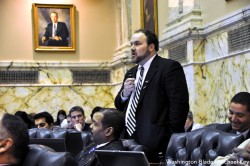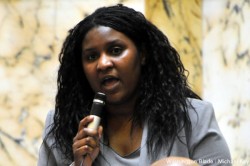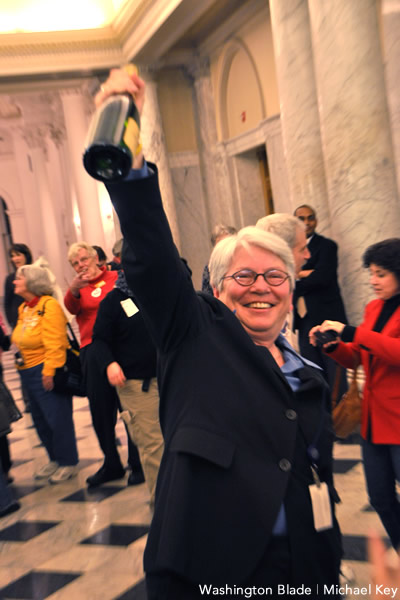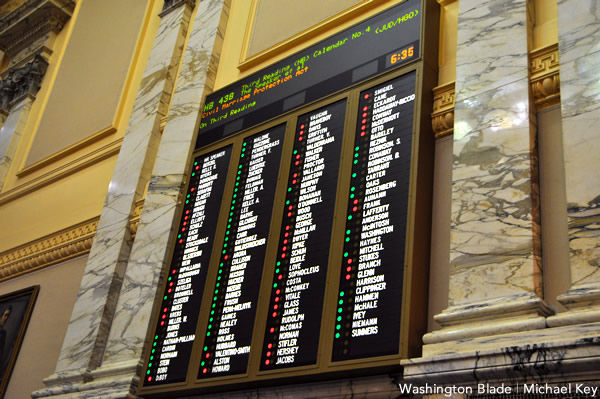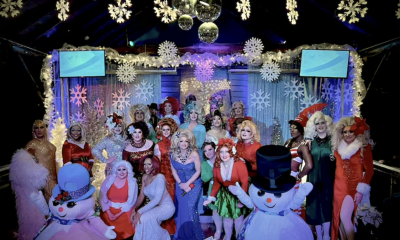Local
Marylanders celebrate as House OKs marriage bill
Intense floor debate leads to dramatic victory; referendum on horizon
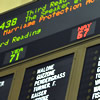
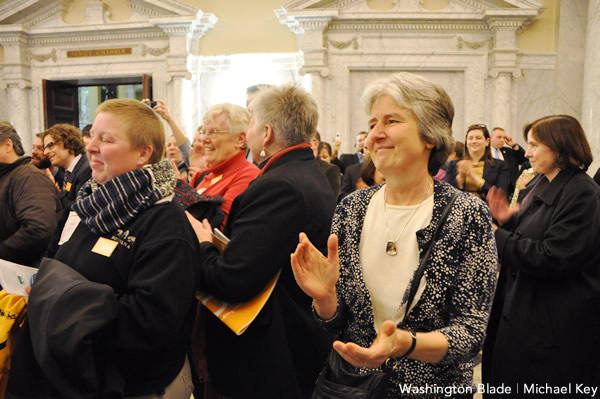
The crowd gathered at the Maryland Capitol cheered ecstatically when the marriage bill passed. (Washington Blade photo by Michael Key)
ANNAPOLIS, Md. — A jubilant crowd erupted into cheers outside the House of Delegates chambers Friday night, as news broke that lawmakers had approved the Civil Marriage Protection Act in a close 72-67 vote.
The dramatic outcome — the bill passed by two votes, triggering a raucous cheer in the chambers — followed an emotional debate over the measure that would extend marriage rights to same-sex couples in the Free State. The bill now goes to the Senate, which passed a similar measure last year, and is expected to vote on the bill in the coming weeks.
MORE PHOTOS AND COVERAGE OF THE DEBATE LEADING UP TO THE WIN FROM THE BLADE.
Gov. Martin O’Malley has made the bill a priority and testified in favor of it at a House committee hearing. Assuming the Senate passes it as expected and O’Malley signs as promised, opponents would have until May 31 to collect 55,736 valid signatures to qualify a measure for the November ballot that would strike down the law.
“I didn’t do anything, we all did it,” Del. Luke Clippinger (D-Baltimore) said after the historic vote. “And now we’re sending this bill to Sen. Madaleno in the Senate, and we believe we’ll get this bill passed, and get it to the governor’s desk, and he’ll sign it right away.”
“As a big baseball fan, I’m guessing this is what it feels like to win the World Series,” Del. Heather Mizeur (D-Takoma Park), a lesbian, told the Blade.
Clippinger became emotional as he rose to encourage his colleagues to support extending marriage rights to himself, the six other openly gay and lesbian delegates in the Maryland House, their colleague Sen. Richard Madaleno, and thousands of same-sex couples throughout Maryland.
“I ask you to vote ‘yes’ because the joy felt by two parents raising children shouldn’t be overshadowed by fear that the other parent might not be able to care for that child in a time of crisis,” Clippinger proclaimed to his fellow legislators. “But more, I’m here tonight to ask you to vote ‘yes,’ as I have before. Because I am here as a child of God, perfect in my imperfections. Because I am here — not less than any other person — but a full beneficiary to all of God’s infinite love, just as each and every person is. Because I am here as a Marylander.”
The final floor speech before the close vote was delivered by Del. Tiffany Alston, who angered many LGBT advocates in 2011 when she pulled her support for the bill. Alston spoke to the delegates about the difficulty she had coming to her decision to once again support gender neutral marriage in Maryland.
“I can say that my religion still tells me that marriage is between a man and a woman,” Alston said in a shaking voice, clearly emotional. “And I can tell you I still believe it’s OK for people of the same sex to get married. But what I know, is that as a state it’s time for us to move beyond this issue.”
“Today, I’m going to cast a green vote in support of the bill.” Alston adding, noting that she supports a referendum on the issue.
Upon her proclamation, many of the gay and lesbian lawmakers — including Clippinger, who had been a driving force behind the bill — became visibly emotional.
Alston offered one of two amendments that was accepted by the legislature earlier in the afternoon, which would ensure that the law could not take effect until all legal challenges to the law and any possible referendum were settled. However, according to the Maryland Constitution, a law cannot take effect until any referendum challenge has been settled in any case, meaning the Alston amendment merely restated existing state law.
Supporters of same-sex marriage were happy to back Alston’s amendment if it meant comfort to those lawmakers hesitant to support the bill before them because they feared a referendum would be blocked.
“It was something that could add a level of comfort for some people,” Del. Mary Washington (D-Baltimore), a lesbian, told the Blade, after the amendment was accepted 81-52. “This is something that we could negotiate on.”
Mizeur told the Blade that the fate of Alston’s vote on the bill itself was in the balance up to the afternoon of the vote. Throughout the proceedings, Alston seemed emotional, often resting her head in her hands as she sat at her desk, and looking around the room at her colleagues as they delivered their speeches for and against the bill.
“We talked about it as a possibility yesterday, and we were putting things in play to see if it would work,” Mizeur said. “By this morning, I was told 50/50, and we didn’t exactly know for sure when we were heading into the floor. It was that close.”
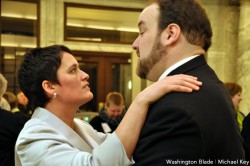
Dels. Heather Mizeur and Luke Clippinger embraced following the vote. (Washington Blade photo by Michael Key)
The bill’s supporters were grateful for Alston’s vote, as her change of heart in March 2011 elicited a backlash from many in the LGBT community.
Another amendment that the delegates passed was a measure that would have changed the date that the law went into effect from October to January.
A rejected amendment would have changed “civil marriage” to “civil unions,” in the law, a change that at least four of those who eventually voted against the bill said would have helped persuade them to support the measure, including former National Football League quarterback, Del. Jay Walker, who cited his fellow former NFL player, gay defensive tackle Esera Tuaolo in his remarks.
Another rejected amendment would have changed the legal age of consent for same-sex marriage to 18, and a fourth would have allowed parents to opt their children out of same-sex marriage related curriculum that they found offensive, which lesbian Del. Anne Kaiser argued the law already allows.
During the floor speeches Friday night, Del. Maggie McIntosh (D-Baltimore) gave a moving speech about making history in 2001 when she came out as a lesbian to her fellow lawmakers the same year that the House voted to enact a non-discrimination law covering gays and lesbians in employment.
“In 2001, I became legal,” McIntosh said of the vote, calling it a great moment in history.
Throughout the floor speeches, many of the opponents of the same-sex marriage bill began to move on from discussing the impending vote, to instead rallying for the expected ballot referendum, indicating that at least some of the opponents were expecting the bill to pass.
“It ain’t over ’til it’s over,” Del. Emmett Burns told the legislature, referring to the referendum, and insisting the voters must have their say. “The battle is not over. Same-sex marriage no!”
Many of the opponents referred to a legal fight over an immigration-related referendum that opponents attempted to block in Maryland. A judge has recently allowed that referendum to move forward. Referendum supporters wanted to be assured that there would be no impediments to giving Maryland voters an opportunity to overturn marriage, should it pass the Senate.
In contrast to the opposition, many LGBT allies in the legislature stood up to encourage their colleagues to do what they believed was right, with Baltimore Del. Keiffer Mitchell, Jr. calling LGBT rights “the civil rights issue of our generation.”
“I will not vote to deny individuals access to the same legal rights and responsibilities that are given to me and my wife by the state,” said Del. John A. Olszewski, Jr., who said he supported religious provisions that allow faith communities to make their own decisions about which marriages to peform. “As I think about one day when my wife and I look back on our time with our kids when they’re reaching [the marrying age], I know that they’ll be thankful, and I’ll be thankful for what I’ve done today.”
Feelings of relief
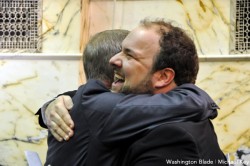
Gay Dels. Peter Murphy and Luke Clippinger embrace following the vote. (Washington Blade photo by Michael Key)
Bill co-sponsor Del. Nathaniel Oaks described a feeling of relief after the bill’s passage, and that sentiment was echoed by almost every other supporter.
“It’s like a big giant weight that’s been lifted, and now we move on,” Del. Mitchell told the Blade, calling the close vote “courageous.” “It’s great to be a part of this history.”
“Tonight can never be taken from us,” Del. Washington told the Blade after the vote.
Voting against the bill was Del. Sam Arora (D-Mont. Co.) who co-sponsored the failed bill of two years ago, and had in 2010 campaigned on a platform that he would support same-sex marriage.
“We feel betrayed,” said progressive activist Karl Frisch, who said that he supported his friend Sam Arora during his election, and said he speaks for many of Arora’s former friends. “This is about family and doing what’s right.”
Frisch told the Blade that a large group of national and local progressive leaders met via conference call Friday night to discuss replacing Del. Arora in his district with another Democrat.
“But it’s nothing personal, in the same way that Sam would claim it’s nothing personal, it’s just his faith,” Frisch said, telling the Blade that Arora took money from those he promised to support marriage equality. “It’s not personal, it’s just our lives. At the end of the day, I wonder how Sam squares his faith with lying and fraud.”
“I have a friend who bought a house in Maryland — not far from his district — and they regret not buying the house in his district so they would be able to vote against him in the next election,” Frisch said. “I hope he has trouble sleeping at night with the shame on his conscience.”
Another damper on last night’s celebrations was the looming prospect of referendum.
“We know there’s people probably out there right now with their petitions gathering signatures,” said Lisa Polyak, chair of the Equality Maryland board of directors. “We have a strategy that we’ve already been working on for months now about how we’re going to 50 plus 1, but we’ll worry about that tomorrow. Tonight we’re going to celebrate.”
Supporters jubilant, eyes on referendum
On the subject of a referendum threat, Clippinger said he is confident that same-sex couples in Maryland will see victory there too.
“We are going to win. The only people that are going to keep us from winning are those who doubt that we can.”
“Today, the House of Delegates voted for human dignity,” Gov. Martin O’Malley said in a statement. “Speaker Busch and his fellow delegates deserve a lot of credit for their hard work. At its heart, their vote was a vote for Maryland’s children.”
He continued, “There is still work to be done and marriage equality has not yet been achieved in Maryland. Wherever we happen to stand on the marriage equality issue, we can agree that all our children deserve the opportunity to live in a loving, caring, committed, and stable home, protected equally under the law.”
“We could not be more grateful to the delegates who today voted to make all Maryland families stronger,” said Joe Solmonese, president of the Human Rights Campaign. “Today, we took a giant step toward marriage equality becoming law – and we are in this position due to the unwavering leadership and resolve of Governor O’Malley, Speaker Busch and our legislative allies.”
Dana Beyer, Gender Rights Maryland executive director, cheered the victory for gay and lesbian Marylanders, telling the Blade she felt “joy.”
“It changes the culture,” Beyer told the Blade. “That’s probably the most important thing. Now we have to do the heavy lifting and deal with the referendum, and that’s why I’m here to do that, and hopefully to get the gender identity bill through, now that this is off the table, so that we can have a duopoly this year.”
District of Columbia
Gay GOP group hosts Ernst, 3 House members — all of whom oppose Equality Act
Log Cabin, congressional guest speakers mum on June 25 event

U.S. Sen. Joni Ernst (R-Iowa) and three women Republican members of the U.S. House appeared as guest speakers at the June 25 meeting of Log Cabin Republicans of D.C., the local chapter of the national LGBTQ Republican group with that same name.
The U.S. House members who joined Ernst as guest speakers at the Log Cabin meeting were Celeste Maloy (R-Utah), Kat Cammack (R-Fla.), and Julia Letlow (R-La.).
Neither D.C. Log Cabin Republicans President Andrew Minik nor spokespersons for Ernst or the three congresswomen immediately responded to a request by the Washington Blade for comment on the GOP lawmakers’ appearance at an LGBTQ GOP group’s meeting.
“Please join us for an inspiring evening as we celebrate and recognize the bold leadership and accomplishments of Republican women in Congress,” a D.C Log Cabin announcement sent to its members states.
“This month’s meeting will highlight the efforts of the Republican Women’s Caucus and explore key issues such as the Protection of Women and Girls In Sports Act and the broader fight to preserve women’s spaces in society,” the message says.
It was referring to legislation pending in Congress calling for banning transgender women from participating in women’s sports events.
According to media reports, Ernst and the three congresswomen have expressed opposition to the Equality Act, the longstanding bill pending in Congress calling for prohibiting discrimination based on sexual orientation and gender identity in the areas of employment, housing, and public accommodations.
The Log Cabin announcement says the meeting was scheduled to take place at the Royal Sands Social Club, which is a restaurant and bar at 26 N St., S.E. in the city’s Navy Yard area.
D.C. Log Cabin member Stuart West, who attended the meeting, confirmed that Ernst and the three congresswomen showed up and spoke at the event.
“It was a good turnout,” he said. “I would definitely say probably 30 or 40 people attended.” West added, “Four women came to talk to a group of mostly gay men. That’s something you don’t see very often.”
District of Columbia
D.C. police seek public’s help in July 5 murder of trans woman
Relative disputes initial decision not to list case as hate crime

D.C. police are seeking help from the public in their investigation into the murder of a transgender woman who they say was shot to death at about 12:30 a.m. on Saturday, July 5, on the 2000 block of Benning Road, N.E.
But the police announcement of the fatal shooting and a police report obtained by the Washington Blade do not identify the victim, 28-year-old Daquane ‘Dream’ Johnson of Northeast D.C., as transgender. And the police report says the shooting is not currently listed as a suspected hate crime.
It was local transgender activists and one of Johnson’s family members, her aunt, who confirmed she was transgender and said information they obtained indicates the killing could have been a hate crime.
“On Saturday, July 5, at approximately 12:51 a.m., Sixth District officers were flagged down in the 2000 block of Benning Road, Northeast, for an unconscious female,” a July 5 D.C. police statement says. “Upon arrival, officers located an adult female victim suffering from gunshot wounds,” it says.
“D.C. Fire and EMS responded to the scene and transported the victim to a local hospital where after all lifesaving efforts failed and the victim was pronounced dead,” the statement says.
A separate police flyer with a photo of Johnson announces an award of $25,000 was being offered for information leading to the arrest and conviction of the person or persons responsible for the murder.
The flyer identifies D.C. police Homicide Detective Natasha Kennedy as being the lead investigator in the case and says anyone with information about the case should contact her at 202-380-6198.
Longtime D.C. transgender rights advocate Earline Budd told the Blade that one of the police investigators contacted her about the case and that she also spoke to Detective Kennedy. Budd said police confirmed to her that Johnson was a transgender woman.

One of Johnson’s family members, Vanna Terrell, who identified herself as Johnson’s aunt, told the Blade that Johnson used the first name of Dream and had planned to legally adopt that name instead of Daquane but had not gotten around to doing so.
Terrell said she and other family members learned more about the incident when one of two teenage high school students who knew Johnson’s brother contacted a friend and told the friend that they recognized Johnson as they witnessed the shooting. Terrell said the friend then called her to tell her what the friend learned from the two witnesses.
According to Terrell, the witnesses reportedly saw three men approach Johnson as Johnson walked along Benning Road and one of them called Johnson a derogatory name, leading Terrell to believe the men recognized Johnson as a transgender woman.
Terrell said one of the witnesses told the friend, who spoke to Terrell, that the man who shot Johnson kept shooting her until all of the bullets were fired. Budd, who said she spoke to Terrell, who also told her what the witnesses reported, said she believed the multiple shots fired by the shooter was an “overkill” that appears to have been a hate crime. Terrell said she too believes the murder was a hate crime.
In response to an inquiry from the Blade, Officer Ebony Major, a D.C. police spokesperson, stated in an email, “At this point there is nothing in the investigation that indicates the offense was motivated by hate or bias.”
Terrell said a memorial gathering to honor Johnson’s life was scheduled to be held Saturday, July 12, at River Terrace Park, which is located at 500 36th St., N.E. not far from where the shooting occurred.

District of Columbia
LGBTQ voters divided in Ward 8 special election
All four candidates on DC Council seat ballot are allies

Political observers, including LGBTQ activists, believe LGBTQ voters in Ward 8, like most if not all voters in the ward, are divided over which of the four candidates to support in the July 15 special election to fill the ward’s vacant D.C. Council seat.
Each of the four candidates, all of whom are Democrats, including ousted Ward 8 council member Trayon White, who is running to recapture his seat, have expressed support for LGBTQ related issues.
The special election was called earlier this year after the D.C. Council voted unanimously to expel White following his indictment and arrest by the FBI on a federal bribery charge in August 2024.
He has pleaded not guilty to the charge and under D.C. law he can legally run for and regain his council seat until the time he is convicted of the charge. His trial is scheduled to begin in January 2026.
The three candidates challenging White — Sheila Bunn, Mike Austin, and Salim Adofo — are longtime Ward 8 community advocates who have been involved in local government affairs for many years and, according to LGBTQ activists who know them, have been supportive of LGBTQ rights.
White also has a record of supporting LGBTQ issues while serving on the council since 2017. Following his indictment, he won re-election by a wide margin in the November 2024 general election against a lesser-known Republican opponent.
Political observers say White’s indictment on a bribery charge is likely to alienate some of his past supporters, but they say he remains popular in the ward, and with three candidates dividing the opposition vote he could win the election with less than 50 percent of the divided vote count.
Two of the candidates, Bunn and Adofo, responded to a request by the Washington Blade sent to each of the four candidates asking for a statement summarizing their positions on LGBTQ related issues. In their respective statements Bunn and Adofo expressed strong support on a wide range of LGBTQ issues.
“In my nearly 30 years of public service, I have consistently supported the rights and worked to improve the quality of life for the LGBTQIA+ community,” Bunn said in her statement. She noted that much of her work on behalf of LGBTQ rights took place when she served as chief of staff for D.C. Congressional Delegate Eleanor Holmes Norton and as a senior staff member for former D.C. Mayor Vincent Gray.
In his statement, Adofo said he advocated for a wide range of LGBTQ issues, including housing programs for homeless LGBTQ youth and supportive employment training programs for transgender residents.
“At the heart of our platform is a steadfast commitment to uplifting LGBTQ+ communities, ensuring that policy is shaped not just for them, but with them,” his statement says. Adofo’s positions in support of LGBTQ rights are also posted on his campaign website.
GLAA D.C, formerly known as the Gay and Lesbian Activists of Washington, released its ratings of three of the four candidates on June 22, based on its recent policy of basing its ratings mostly on non-LGBTQ specific issues. The group rates candidates on a scale of -10, the lowest possible rating, to +10, its highest rating.
It assigned a rating of +7.5 for Bunn, +6.5 for Austin, and +4.5 for Adofo. In a statement accompanying its ratings, GLAA said each of the three have a record of support on LGBTQ issues, but they lost rating points for not supporting non-LGBTQ related issues deemed important by GLAA.
GLAA said it did not issue a rating for White based on its policy of not rating candidates who are removed from office or resign due to allegations of ethics violations.
The Capital Stonewall Democrats, D.C.’s largest local LGBTQ political group, chose not to make an endorsement in the Ward 8 special election.
“We thought that this is best because this is a special election and in these unfamiliar times, we decided not to take a stand,” Howard Garrett, the group’s president, told the Blade.
Ward 8 gay Democratic activist Phil Pannell is supporting Adofo, he told the Blade, on grounds of Adofo’s strong support on LGBTQ issues and Adofo’s role as the only candidate in the Ward 8 special election who supported Initiative 83, the ballot measure passed by D.C. voters in November 2024 calling for a ranked choice voting system and open D.C. primaries. A lawsuit challenging the initiative filed by the D.C. Democratic Party has delayed its implementation.
Another longtime Ward 8 gay Democratic activist, David Meadows, is supporting Bunn. Meadows cites Bunn’s support for LGBTQ rights and her positions on other issues he supports as his reason for backing her candidacy.
The D.C. Board of Elections website shows that the board mailed ballots for the special election to all Ward 8 registered voters. The website shows that as of July 7, 2,483 voters sent back their ballots by mail or placed them in drop boxes located throughout the ward.
Early in-person voting at several polling places was scheduled to begin July 11, the website says, prior to the official election date of July 15 at all polling places throughout the ward.
Salim Adofo statement on LGBTQ issues:
Our campaign is rooted in the belief that everyone deserves to live with dignity, security, and opportunity. We are committed to building a safer, healthier, and more equitable District for all — where every voice is heard and every community is empowered. At the heart of our platform is a steadfast commitment to uplifting LGBTQ+ communities, ensuring that policy is shaped not just for them, but with them. We recognize that the fight for equity is interconnected, and we prioritize action in the areas that most deeply impact our residents’ daily lives. As [a] council member, I will advocate for healthcare for all, boost funding for HIV/AIDS, Hepatitis, STD, and TB Administration (HAHSTA) programs to address disparities in health outcomes.
• Expand access to care by exempting digital-only telehealth services from the Certificate of Need (CON) process and increasing funding through the Department of Behavioral Health (DBH).
• Build a culturally competent workforce by removing licensure barriers and expanding the pipeline of LGBTQ+ mental health providers.
• Employment and economic equity: sustain workforce development efforts like Project LEAP, a successful investment in economic empowerment for TGD residents.
• Foster public-private partnerships by requiring D.C. HR to work with labor unions and local employers to host trans-affirming job fairs.
• Fund community-led training by supporting programs developed by TGD organizations, modeled after California’s Transgender Economic Empowerment Initiative.
• Housing with dignity: every LGBTQ+ resident deserves stable, affirming, and permanent housing. End youth homelessness with a community-centered strategic plan focused on expanding permanent housing and wraparound services.
• Support inclusive housing by continuing funding for LGBTQ+ housing vouchers and senior housing initiatives.
• Safety and community support: create safe shelters by investing $2 million in a 20-bed LGBTQIA2S+ shelter for survivors of intimate partner violence and sexual assault.
• Empower community organizations with no-cost capacity-building support and streamlined access to D.C. grants for LGBTQ+-serving CBOs.
Sheila Bunn statement on LGBTQ issues:
In my nearly 30 years of public service, I have consistently supported the rights and worked to improve the quality of life for the LGBTQIA+ community.
As chief of staff to Congresswoman Eleanor Holmes Norton, I helped prevent Congress from overturning the District’s 2009 marriage equality bill and worked on removing congressional riders from the District’s budget that prohibited the expenditure of locally raised funds for our needle-exchange program, which has been pivotal in HIV/AIDS prevention.
As part of Mayor Vincent C. Gray’s senior staff, I assisted in launching the District’s transgender employment initiative under the Project Empowerment Program, increasing training and job opportunities for transgender residents. We also employed a member of the transgender cohort in the Mayor’s Office of Community Affairs after their tenure, demonstrating our commitment to the program. I facilitated efforts to end health insurance discrimination based on gender identity with DISB’s 2013 bulletin, ensuring coverage for services like mastectomies and hormone replacement therapy. Additionally, I helped to coordinate Mayor Gray’s first LGBTQIA+ Youth Town Hall to address the concerns of LGBTQIA+ youth and participated in cultural competency training to better support the District’s significant LGBTQIA+ population.
Currently, I am a member of the Capital Stonewall Democrats, actively engaging in Pride events and supporting LGBTQIA+ causes like the DC LGBTQ+ Community Center, a one-stop shop for services and programs with critical social service partners. Through direct outreach to organizations serving the LGBTQIA+ community, I aim to understand and represent their issues effectively. I look forward to collaborating with GLAA, Capital Stonewall Democrats, and other allied organizations to shape legislation and policies that benefit our LGBTQIA+ residents and all District residents.

